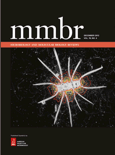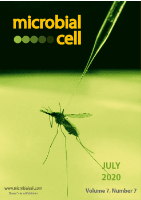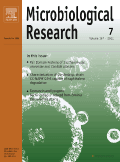
MICROBIOLOGY AND MOLECULAR BIOLOGY REVIEWS
Scope & Guideline
Bridging Microbial Insights with Molecular Innovations
Introduction
Aims and Scopes
- Pathogenesis and Host-Pathogen Interactions:
A core focus of the journal is on the mechanisms by which microorganisms cause disease and their interactions with host organisms. This includes studies on bacterial virulence factors, immune evasion strategies, and the role of the microbiome in health and disease. - Microbial Ecology and Evolution:
The journal emphasizes the ecological roles of microorganisms in various environments, including their evolutionary adaptations, interactions within communities, and implications for ecosystem health and stability. - Molecular Mechanisms and Techniques:
Research on the molecular biology of microbes, including genetic regulation, signaling pathways, and innovative molecular techniques such as CRISPR and functional genomics, is a significant aspect of the journal's contributions. - Antimicrobial Resistance and Control Strategies:
The journal addresses the critical issue of antimicrobial resistance, exploring the molecular basis of resistance mechanisms, the evolution of resistance traits, and potential strategies for infection control and prevention. - Biotechnology and Applied Microbiology:
The application of microbial processes in biotechnology, including bioremediation, fermentation, and the production of bioactive compounds, is also a key area of interest, highlighting the practical implications of microbiological research.
Trending and Emerging
- Microbiome Research and Human Health:
There is a growing interest in understanding the role of the microbiome in human health and disease, particularly in relation to gut microbiota and its implications for metabolic and immune functions. - Viral Pathogenesis and Host Interactions:
Research on viral pathogens, especially with respect to their mechanisms of infection and interaction with host immune systems, is on the rise, reflecting the ongoing impacts of viral diseases such as COVID-19. - Interdisciplinary Approaches to Microbial Research:
The integration of microbiology with fields such as bioinformatics, systems biology, and environmental science is increasingly prominent, highlighting the need for comprehensive approaches to tackle complex microbial systems. - Emerging Infectious Diseases and Zoonoses:
There is heightened attention on emerging infectious diseases, particularly those that have zoonotic origins, underscoring the importance of understanding cross-species transmission dynamics. - Innovative Therapeutic Strategies:
Recent trends indicate an increasing focus on novel therapeutic approaches, including the use of bacteriophages, antimicrobial peptides, and immunotherapies to combat resistant pathogens.
Declining or Waning
- Traditional Antibiotic Mechanisms:
While antimicrobial resistance remains a vital topic, the exploration of traditional antibiotic mechanisms appears to be less frequent in recent publications, possibly due to the emergence of alternative therapies and a focus on resistance mechanisms. - Basic Bacterial Physiology Studies:
There has been a noticeable decrease in studies focusing solely on basic bacterial physiology without direct applications or implications for health and disease, suggesting a shift towards more integrative and applied research. - Fungal Taxonomy and Classification:
Research dedicated specifically to the taxonomy of fungi seems to be waning, as more emphasis is placed on functional studies and the ecological roles of fungal species rather than their classification alone. - Single-Organism Studies:
There is a trend away from studies focusing exclusively on single microbial species in isolation, with a growing preference for research that examines interactions within microbial communities or between multiple organisms.
Similar Journals

Microbial Cell
Innovating the study of microbial functions and genetics.Microbial Cell is a distinguished open-access journal published by SHARED SCIENCE PUBLISHERS OG, focusing on the dynamic fields of microbiology, biochemistry, and molecular biology. Since its establishment in 2014, Microbial Cell has been at the forefront of disseminating cutting-edge research essential for advancing our understanding of microbial functions and interactions. With a commendable impact factor and ranking in the top quartiles (Q1 and Q2) across several categories, including Applied Microbiology and Biotechnology and Parasitology, this journal serves as an invaluable resource for researchers, professionals, and students alike. It features a comprehensive scope that encompasses the latest findings in genetics, cell biology, and virology, facilitating the academic community's access to high-quality peer-reviewed work. Microbial Cell not only contributes to advancing microbial sciences but also fosters an inclusive platform for knowledge sharing and collaboration in the scientific community.

MOLECULAR MICROBIOLOGY
Unveiling the Molecular Secrets of MicrobiologyMOLECULAR MICROBIOLOGY is a prestigious academic journal published by Wiley that has been at the forefront of research in the fields of microbiology and molecular biology since its inception in 1987. With an impressive Q1 rating in Microbiology and a Q2 rating in Molecular Biology for 2023, this journal serves as a vital platform for disseminating high-impact research that advances our understanding of microbial processes and interactions at the molecular level. The journal's ISSN is 0950-382X, and the E-ISSN is 1365-2958, making it easily accessible to a global audience of researchers, professionals, and students. Though not an Open Access journal, MOLECULAR MICROBIOLOGY remains committed to providing valuable insights and fostering knowledge exchange in the academic community. Situated in the United Kingdom and indexed in prominent databases like Scopus, the journal holds a strong standing, with current rankings reflecting its influential role in the academic landscape. Researchers in the field are invited to contribute and engage with cutting-edge discoveries that will shape the future of microbiological sciences.

Virulence
Innovating Solutions for Global Health ChallengesVirulence, a leading academic journal published by Taylor & Francis Inc, is dedicated to advancing the understanding of virulence mechanisms in pathogens across various infectious diseases. Since becoming an Open Access publication in 2018, it has broadened the accessibility of cutting-edge research for a global audience, promoting collaboration and knowledge-sharing among researchers, professionals, and students alike. With a significant impact within its field, the journal boasts impressive 2023 quartile rankings: Q2 in Immunology and Q1 in both Infectious Diseases and Microbiology, alongside notable standings in Parasitology. The current Scopus rankings reinforce its prominence, with high percentiles indicating its influence and relevance in advancing scientific inquiry. Covering a period from 2010 to 2024, Virulence serves as an essential platform for innovative research that not only addresses the critical challenges in understanding pathogen behavior but also contributes towards global health solutions, establishing it as a vital resource in the rapidly evolving fields of immunology, microbiology, and parasitology.

MICROBIOLOGICAL RESEARCH
Unveiling Breakthroughs in Microbial ResearchMICROBIOLOGICAL RESEARCH, published by Elsevier GmbH, serves as a leading platform for advancements in the field of Microbiology, holding an impressive Q1 ranking in its category as of 2023. With an ISSN of 0944-5013 and E-ISSN 1618-0623, this journal has been instrumental in disseminating high-quality research since its inception in 1994 and continues to contribute significantly to the academic landscape through 2024. Positioned within the top 13% of publications in the Immunology and Microbiology category, ranked #24 out of 182 according to Scopus, it attracts the attention of researchers, professionals, and students alike. While the journal is not open access, it offers vital insights and peer-reviewed articles that drive innovation and exploration within microbiological research. Its rigorous selection process underscores the importance of quality and relevance in advancing knowledge in this dynamic field.

Molecular Genetics Microbiology and Virology
Advancing the Frontiers of Molecular ScienceMolecular Genetics Microbiology and Virology is an esteemed academic journal published by PLEIADES PUBLISHING INC, specializing in the complex interplay of genetics, microbiology, and virology. Established in 2007, this journal serves as a crucial platform for researchers and professionals committed to advancing our understanding of infectious diseases and molecular biology. Despite its current categorization in Q4 across several fields, the journal aims to evolve and foster significant discourse within the scientific community. While not an open access journal, it provides essential insights and high-quality research articles that contribute to the body of knowledge in molecular genetics and related disciplines. Located in the vibrant research landscape of New York, USA, the journal also encourages new submissions that address cutting-edge research topics and emerging trends in infectious diseases, thereby appealing to both emerging scholars and seasoned experts alike.

FASEB JOURNAL
Illuminating the Pathways of Health and DiseaseFASEB JOURNAL, published by Wiley, stands as a leading interdisciplinary platform in the realm of biological sciences, prominently featured in the United States. With an impressive 2023 impact factor placing it in the Q1 category across various fields including Biochemistry, Biotechnology, Genetics, Molecular Biology, and Medicine (miscellaneous), the journal is recognized for its substantial contribution to advancing knowledge and innovation. It serves as a vital resource for researchers, professionals, and students alike, providing high-quality, peer-reviewed articles that explore the molecular and cellular mechanisms underlying health and disease. The FASEB JOURNAL not only emphasizes accessible scientific communication but also fosters collaboration within these dynamic fields, making it an essential publication for anyone engaged in cutting-edge life sciences research. To explore more about the journal's offerings and access its vast repository of scholarly articles, visit their official page.

Microbial Physiology
Fostering Discoveries for Health and SustainabilityMicrobial Physiology is a premier, peer-reviewed journal published by KARGER, dedicated to advancing the field of microbiology through innovative research and reviews. With an ISSN of 2673-1665 and an E-ISSN of 2673-1673, the journal stands out in the academic landscape having established a strong track record since its inception in 2020, converging its scope until 2024. It proudly holds a Q2 category ranking in several key areas including Applied Microbiology and Biotechnology, Biochemistry, and Microbiology, making it an essential resource for researchers and professionals in these disciplines. The journal provides open access options to ensure that cutting-edge findings are widely disseminated, fostering collaboration and knowledge sharing. As a vital contributor to the ongoing discourse in microbial physiology, the journal serves as a platform for novel discoveries and methodologies that can significantly impact health, industry, and environmental sustainability. Located in Basel, Switzerland, it brings together a global community of scholars eager to further explore the complexities of microbial life.

Frontiers in Cellular and Infection Microbiology
Pioneering research for a healthier tomorrow.Frontiers in Cellular and Infection Microbiology, published by FRONTIERS MEDIA SA, is a leading Open Access journal that has been at the forefront of microbiological research since 2011. Located in Switzerland, this journal aims to provide a platform for innovative and impactful studies in various domains including immunology, infectious diseases, and medical microbiology. With an impressive range of quartile rankings—Q1 in Infectious Diseases, Microbiology, and Microbiology (medical), and Q2 in Immunology—as of 2023, it positions itself as a highly reputable source in the academic community. Furthermore, its Scopus rankings highlight its significance within the respective fields, with top percentiles in key categories, making it an essential resource for researchers, professionals, and students alike. As an Open Access publication, it ensures that vital findings are accessible to a global audience, fostering collaboration and advancement in science.

Malaysian Journal of Microbiology
Innovating Microbiology: Bridging Local Insights and Global ImpactMalaysian Journal of Microbiology is a prestigious open-access journal dedicated to advancing the field of microbiology, published by the Malaysian Society for Microbiology. Since its inception in 2005, this journal has become an essential platform for researchers and practitioners, facilitating the dissemination of innovative studies in applied microbiology, biotechnology, and infectious diseases. Based in Penang, Malaysia, this journal not only focuses on local microbiological research but also positions itself within the broader global scientific community. Although currently placed in the Q4 category in several relevant fields—including Applied Microbiology and Biotechnology, Infectious Diseases, and Medical Microbiology according to the 2023 Scopus rankings—it plays a crucial role in encouraging novel research and fostering collaboration among scientists. The journal encourages submissions that contribute to the understanding of microbial processes, disease mechanisms, and novel biotechnological applications, thereby supporting the continuous growth of knowledge in microbiology. With open access since its launch, the Malaysian Journal of Microbiology ensures that all published works are freely available to the public, enhancing their visibility and impact within the scientific community.

Microorganisms
Innovating discoveries in microbiology and virology.Microorganisms is a leading open-access journal published by MDPI based in Switzerland, catering specifically to the rapidly evolving fields of microbiology and virology. Since its inception in 2013, the journal aims to foster the dissemination of high-quality research through its comprehensive and interdisciplinary platform, with a particular focus on both fundamental and applied microbiological sciences. Contributing to its esteemed reputation, Microorganisms holds a commendable Q2 ranking in the categories of Microbiology and Virology, as well as in Medical Microbiology, highlighting its significance in the academic community. With a consistent impact, evidenced by its rankings in Scopus—such as rank #25 in Virology and #56 in Microbiology—the journal serves as an invaluable resource for researchers, professionals, and students looking to stay at the forefront of microbiological research. As an open-access journal, Microorganisms ensures that vital research findings are readily available to a global audience, promoting collaboration and innovation in the study of microbial life and its implications for health and disease.